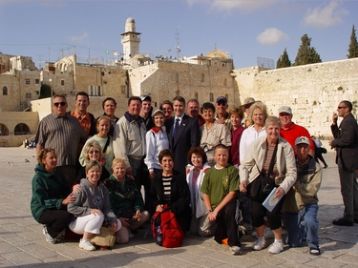"The withdrawal plan is understandably controversial and difficult for many families living in Gaza. But I also believe that the withdrawal is a crucial step toward securing a lasting peace..."
 Bill Frist (in center) with Knoxville Church Group
Bill Frist (in center) with Knoxville Church Group
Click HERE to see Frist's statement on West Bank Visit
(Senate Floor Statement -- Remarks As Prepared For Delivery)
May 10th, 2005 - Mr. President, last week, I had the opportunity to travel throughout the Middle East. My stops included Israel, the West Bank, Jordan, Lebanon, and Egypt. It was a fascinating and illuminating trip.
I gained a first-hand view of the many challenges facing the region. I also came away with a greater appreciation for the remarkable developments we have witnessed in recent months - the elections in the Palestinian Authority, the Cedar Revolution in Lebanon, and the reforms taking place in Egypt. I am more hopeful than ever that progress and democracy are on the march.
My first stop was in Jerusalem. There I had the chance to explore the rich history of the Old City - the heart of three of the world's major religions. I visited the Church of the Holy Sepulcher, the Temple Mount, and the Western Wall. It was remarkable to witness the sight of people of different faiths practicing their beliefs side by side-it gives me confidence in the future. I was truly overwhelmed by the Old City's holiness and history.
I also had the chance to meet with several Israeli political leaders. I was joined by Senator Lieberman to talk about the roadmap with Prime Minister Ariel Sharon. The Prime Minister discussed his courageous decision to withdraw from the Gaza Strip.
We also discussed the importance of coordinating the withdrawal with the Palestinians in order to ensure stability and security in the Gaza Strip after the withdrawal.
I believe his Gaza disengagement plan is a bold and truly historic step. The success of the plan, however, will ultimately depend on the Palestinian's ability to stop terrorist acts, strengthen democratic institutions, provide security, and deliver tangible benefits to the Palestinian people.
I also met with former cabinet minister Natan Sharansky; Knesset Speaker Reuven Rivlin; and Foreign Affairs and Defense Committee Chairman Yuval Steinitz. All three are opposed to the withdrawal plan and are gravely concerned about the militarization of the Sinai and weapons smuggling into Gaza. It was important to hear their views on these critical matters.
Let me say, first of all, I share their concern. The withdrawal plan is understandably controversial and difficult for many families living in the Gaza Strip. But I also believe that the withdrawal is a crucial step toward securing a lasting peace. Our discussion confirmed my belief that the withdrawal must be coordinated with the Palestinian Authority so that the PA can prevent attacks against Israel and make tangible progress back toward the roadmap.
Right now, there is an opening for progress. Both sides have the opportunity to build the trust that will be necessary for negotiations on the most controversial issues. But both sides have to fulfill their obligations.
To begin, Palestinians must dismantle the terrorist groups and stop all terrorist attacks against Israel. And for the Israelis, it is critical to halt settlement activity and expansion. Much more will need to be done as we move along the roadmap.
In my conversation with Prime Minister Sharon, we also discussed our mutual concern about Iran's nuclear ambitions. We agree that a nuclear-armed Iran poses a threat to Israel, the region, to Europe, and to the United States.
In my view, the United States must support the work of our European allies to end Iran's nuclear ambitions diplomatically. Failing that, we must take the issue direct to the United Nation's Security Council for action.
My final meeting was with Finance Minister and former Prime Minister Benjamin Netanyahu. Netanyahu is working hard to ease the tax burden in order to stimulate his country's economy. His plan is gaining success. The Israeli economic output is now growing at a robust, annual rate of 4%. If Netanyahu is able to make further reforms, we can expect even better growth.
As a doctor, my visit to the Hadassah Hospital was especially rewarding. The Hadassah Hospital is a women's and children's hospital. It has many supporters right here in the United States.
Over the past three years, the Hadassah Hospital has provided care and treatment for victims of 32 suicide attacks. I also learned a lot there about preparing for and responding to the nightmare scenario of a biological or chemical attack.
In all, my trip to Jerusalem confirmed my confidence in the strength of our special relationship with Israel and the need for continued American support for this vital friend and ally. Israel stands for what America stands for.
Ultimately, it is up to the Israelis and the Palestinians to meet face-to-face and make the difficult decisions that will lead to peace.
My meetings with Israel's leaders reinforced my belief that they are willing to take the difficult steps. I will ontinue to do what I can to support them in their efforts.
Tomorrow, I will return to the floor to report on my trip to the West Bank. I believe peace can be achieved and
look forward to sharing with my colleagues the invaluable lessons I learned there and the information I gathered
from the Palestinian point of view.